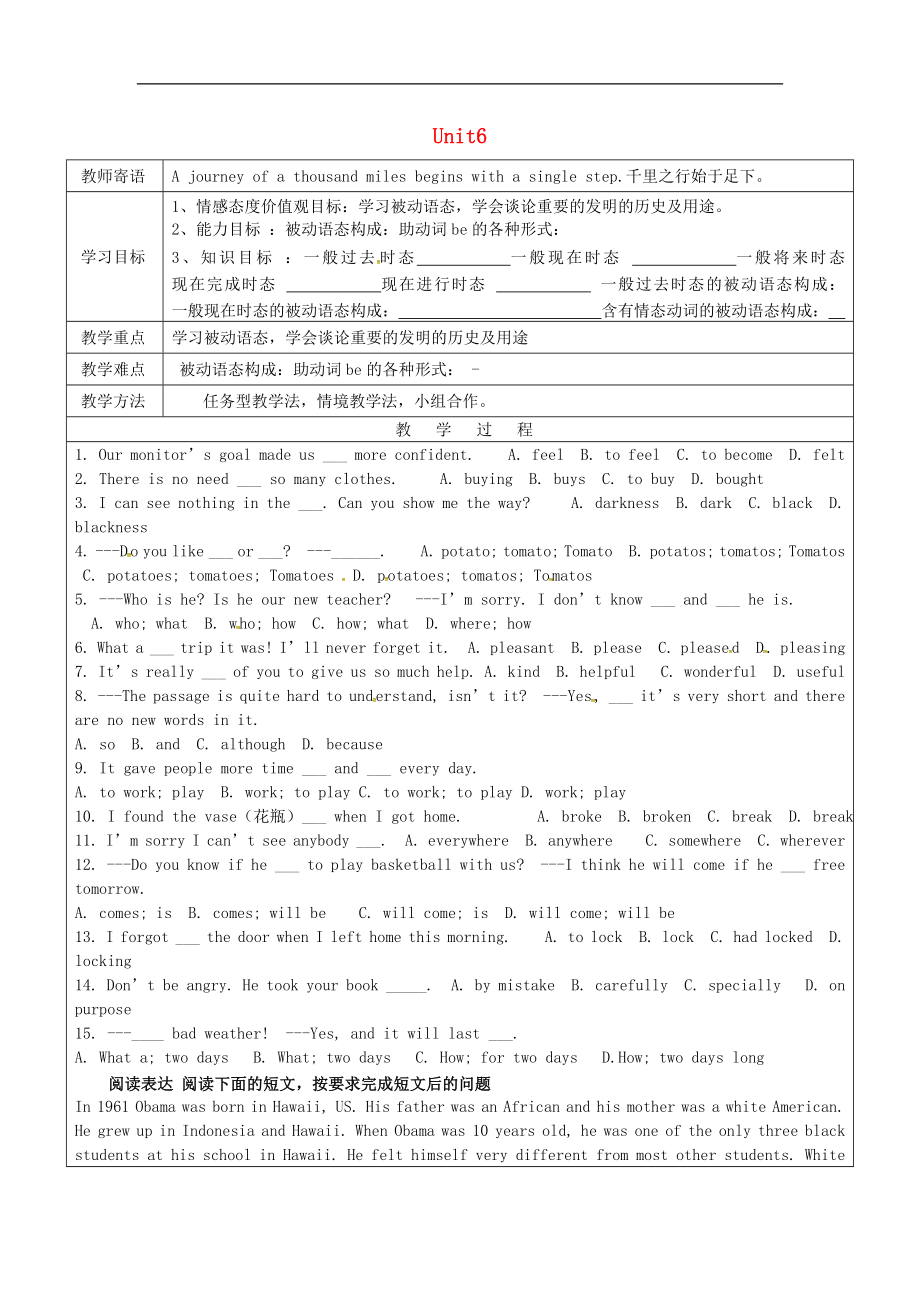《山東省廣饒縣丁莊鎮(zhèn)中心初級(jí)中學(xué)九年級(jí)英語(yǔ)全冊(cè) Unit 6 When was it invented Reading學(xué)案2(無答案)(新版)人教新目標(biāo)版》由會(huì)員分享,可在線閱讀���,更多相關(guān)《山東省廣饒縣丁莊鎮(zhèn)中心初級(jí)中學(xué)九年級(jí)英語(yǔ)全冊(cè) Unit 6 When was it invented Reading學(xué)案2(無答案)(新版)人教新目標(biāo)版(2頁(yè)珍藏版)》請(qǐng)?jiān)谘b配圖網(wǎng)上搜索�。
1��、
Unit6
教師寄語(yǔ)
A journey of a thousand miles begins with a single step.千里之行始于足下����。
學(xué)習(xí)目標(biāo)
1、情感態(tài)度價(jià)值觀目標(biāo):學(xué)習(xí)被動(dòng)語(yǔ)態(tài)����,學(xué)會(huì)談?wù)撝匾陌l(fā)明的歷史及用途。
2����、能力目標(biāo) :被動(dòng)語(yǔ)態(tài)構(gòu)成:助動(dòng)詞be的各種形式:
3、知識(shí)目標(biāo) :一般過去時(shí)態(tài) 一般現(xiàn)在時(shí)態(tài) 一般將來時(shí)態(tài) 現(xiàn)在完成時(shí)態(tài) 現(xiàn)在進(jìn)行時(shí)態(tài) 一般過去時(shí)態(tài)的被動(dòng)語(yǔ)態(tài)構(gòu)成: 一般現(xiàn)在時(shí)態(tài)的被動(dòng)語(yǔ)
2��、態(tài)構(gòu)成: 含有情態(tài)動(dòng)詞的被動(dòng)語(yǔ)態(tài)構(gòu)成:
教學(xué)重點(diǎn)
學(xué)習(xí)被動(dòng)語(yǔ)態(tài),學(xué)會(huì)談?wù)撝匾陌l(fā)明的歷史及用途
教學(xué)難點(diǎn)
被動(dòng)語(yǔ)態(tài)構(gòu)成:助動(dòng)詞be的各種形式: -
教學(xué)方法
任務(wù)型教學(xué)法��,情境教學(xué)法��,小組合作�。
教 學(xué) 過 程
1. Our monitor’s goal made us ___ more confident. A. feel B. to feel C. to become D. felt
2. There is no need ___ so many clothe
3、s. A. buying B. buys C. to buy D. bought
3. I can see nothing in the ___. Can you show me the way? A. darkness B. dark C. black D. blackness
4. ---Do you like ___ or ___? ---______. A. potato; tomato; Tomato B. potatos; tomatos; Tomatos
C. potatoes; tomatoes; Tomatoes D. pot
4�、atoes; tomatos; Tomatos
5. ---Who is he? Is he our new teacher? ---I’m sorry. I don’t know ___ and ___ he is.
A. who; what B. who; how C. how; what D. where; how
6. What a ___ trip it was! I’ll never forget it. A. pleasant B. please C. pleased D. pleasing
7. It’s really
5、 ___ of you to give us so much help. A. kind B. helpful C. wonderful D. useful
8. ---The passage is quite hard to understand, isn’t it? ---Yes, ___ it’s very short and there are no new words in it.
A. so B. and C. although D. because
9. It gave people more time ___ and ___ every day.
A.
6�、 to work; play B. work; to play C. to work; to play D. work; play
10. I found the vase(花瓶)___ when I got home. A. broke B. broken C. break D. breaking
11. I’m sorry I can’t see anybody ___. A. everywhere B. anywhere C. somewhere C. wherever
12. ---Do you know if he ___ to play b
7、asketball with us? ---I think he will come if he ___ free tomorrow.
A. comes; is B. comes; will be C. will come; is D. will come; will be
13. I forgot ___ the door when I left home this morning. A. to lock B. lock C. had locked D. locking
14. Don’t be angry. He took your book _____.
8���、 A. by mistake B. carefully C. specially D. on purpose
15. ---____ bad weather! ---Yes, and it will last ___.
A. What a; two days B. What; two days C. How; for two days D.How; two days long
閱讀表達(dá) 閱讀下面的短文���,按要求完成短文后的問題
In 1961 Obama was born in Hawaii, US. His father was an African and
9、his mother was a white American. He grew up in Indonesia and Hawaii. When Obama was 10 years old, he was one of the only three black students at his school in Hawaii. He felt himself very different from most other students. White girls wanted to touch his hair. A white boy even asked him what his fa
10����、ther was. “I lied to them that my father was a Kenyan prince. But I kept asking myself who I am,”said Obama.
However, 37 years later, the boy made history. Obama became the first black president in US history. This unusual background made him wonder who he was. He once turned to alcohol(酒)to help f
11�����、orget this question.
With the help of his friends, Obama finally turned his life around at college. His hard work made him a star at Harvard. Later, he became the third black senator(參議員)in US history.
4.“Obama’s success has made his dream come true. That is: A man should not be judged(判斷)by the c
12�、olour of his skin, but by the content of his character,”
A. 根據(jù)短文內(nèi)容簡(jiǎn)要回答問題�����。
1. How old was Obama when he became the first black president in US history?
_________________________________________________________________
2. What can we learn from Obama?
____________________________________________
13�、______________ ____
3. Why did he feel himself very different from most other students?
______________________________________________________________
B.將短文中劃線的兩個(gè)句子譯成漢語(yǔ)�����。
4. ______________________________________________________________
C.請(qǐng)給短文擬一個(gè)適當(dāng)?shù)臉?biāo)題�。
5. ______________________________________
14、________________________
用所給單詞的適當(dāng)形式填空
1. Dad, the soup is kind of ________(salt). What shall I do?
2. Oh, these peanuts are ______(crisp) enough, delicious enough..
3. I think we can have a bit soup with _________(potato).
4. Be careful, The water is ________(boil).
5. The stream takes a _________(suddenly) bent to the east.
教 學(xué) 反 思
2
 山東省廣饒縣丁莊鎮(zhèn)中心初級(jí)中學(xué)九年級(jí)英語(yǔ)全冊(cè) Unit 6 When was it invented Reading學(xué)案2(無答案)(新版)人教新目標(biāo)版
山東省廣饒縣丁莊鎮(zhèn)中心初級(jí)中學(xué)九年級(jí)英語(yǔ)全冊(cè) Unit 6 When was it invented Reading學(xué)案2(無答案)(新版)人教新目標(biāo)版

